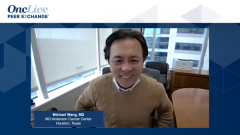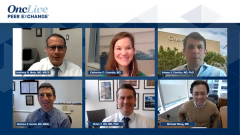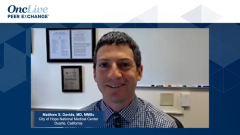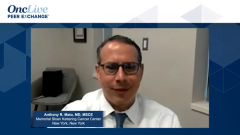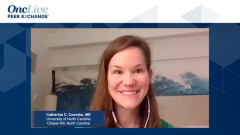
Treatment Overview: Chronic Lymphocytic Leukemia
Catherine C. Coombs, MD, leads the faculty in a discussion of the current treatment landscape for CLL with a review of considerations for patients with high-risk or relapsed/refractory disease.
Episodes in this series

Anthony R. Mato, MD, MSCE: Now we're going to switch gears to Chronic Lymphocytic Leukemia (CLL). I want to start with Callie. We've been saving you now for the CLL section because you have a lot to say. If you could, briefly give me an overview of the first-generation BTK (Bruton tyrosine kinase) inhibitor ibrutinib in terms of its indication in CLL. Could you also comment on the long-term follow-up data that we have available for this agent.? If we could start there, that'd be great.
Catherine C. Coombs, MD: I'd be happy to. Ibrutinib is indicated in CLL both [with] front-line andrelapsed/refractory data. Of course, it is the BTK inhibitor with the longest track record in CLL. Paul Barr recently published up to 8 years of follow-up from ibrutinib [in] the frontline setting where we see 59% of patients are still progression-free at around the 7-year mark. The patients do discontinue the drug due to a variety of reasons, most commonly adverse events, though progressive disease occurs in a smaller subset of patients in the frontline setting. In the relapsed setting, the progression-free survival (PFS) of course is a bit shorter. From the early phase 1/2b trial, the PFS is about 52 months. Of course, we now have head-to-head data comparing ibrutinib to acalabrutinib where the median PFS for both drugs [was] 38 months. We're getting a bigger wealth of data and comparisons to the newer-generation BTK inhibitors.
Anthony R. Mato, MD, MSCE: Alexey, I want you to delve a little bit more into high-risk disease, with ibrutinib specifically. Can you comment on the data that we have, specifically for this drug in patients with del(17p) TP53 mutations?
Alexey V. Danilov, MD, PhD: Yes, so the data with ibrutinib and P53-aberrant disease is highly encouraging. We have data from a single-arm study where, at 5 years, PFS was about 75% in patients with CLL, which, for a single agent, is much better than chemotherapy. Recent data suggests that patients with P53 aberrations do not perform [as] well with bendamustine/rituximab as we expected. It seems that these patients perform just as well as P53 wild-type patients when they are treated with either ibrutinib or ibrutinib/rituximab combinations. Overall, the data is very encouraging, which really positions BTK inhibitors well as the best frontline strategy for patients with TP53-aberrant CLL.
Anthony R. Mato, MD, MSCE: Matt, I want to switch gears to you. I think everybody would agree here that there’s no future [for] ibrutinib plus rituximab. We're not prescribing this. But ibrutinib has also been combined with obinutuzumab, and maybe the Achilles' Heel of that trial was that there was no ibrutinib monotherapy to demonstrate the contribution of effect. Can you comment on updated results for the ibrutinib plus obinutuzumab combination not only in the relapsed/refractory setting, but in the front-line [setting as well]. Do you think this combination has a future in our practices?
Matthew S. Davids, MD, MMSc: In the frontline setting, we have iLLUMINATE study (NCT02264574), as you mentioned, which looked at ibrutinib/obinutuzumab vs chlorambucil/obinutuzumab. Unfortunately, it did not have an ibrutinib only arm, so it is a little hard to sort out how much benefit, if any, the obinutuzumab is adding. We did recently see longer-term follow-up published on the iLLUMINATE study, which continues to look very good for ibrutinib/obinutuzumab, but as we compare it across to other frontline datasets for ibrutinib monotherapy, I don't think there are clear differences that have emerged there.
At the EHA (European Hematology Association) [2022 Hybrid Congress], one of our fellows, Christine Ryan, presented updated data from one of our ISTs on ibrutinib plus obinutuzumab in the relapsed/refractory CLL population. [It is a] relatively small study, 52 patients, but it was a multicenter study, and we did see a 40% rate of CR (complete response) and very few progression events now in this population, getting out to 4 years of follow-up. Certainly, [it] does seem higher than what we would expect with ibrutinib alone in a comparable population of patients, including about a third of patients who had TP53 aberrant disease. Again, it doesn't have a randomized comparator to ibrutinib monotherapy, [so] we don't know for sure that obinutuzumab is adding benefit. In the frontline setting with acalabrutinib, we have seen that obinutuzumab does seem to have some benefit in terms of PFS and maybe even eventually OS (overall survival). I think it is intriguing to wonder whether we should be studying ibrutinib with obinutuzumab further, and it would be great to eventually have a randomized study against ibrutinib monotherapy.
Transcript has been edited for clarity.


